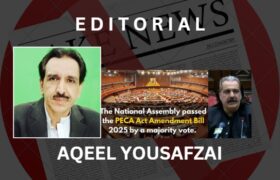Pakistan Should Break the Cycle of Political Instability for Economic Prosperity
Kashif Ahmad
Political and economic stability are prerequisites for the functioning of any state but both the variables are interdependent each affecting the other. Studies in the past have suggested a direct correlation of political instability with the economic meltdown that results in the lower economic growth and per-capita GDP decrease. On the other hand, stable democracies are more likely to sustain economic deterioration as compared to the unstable regimes.
Pakistan is currently passing through the unprecedented political crisis that consequently led the country to significant economic instability. While political instability is not the only factor to Pakistan economic challenges, it remains a significant contributing factor.
If we look at the current attitude and performance of the political elites in the country, they are busy in forwarding their political agenda instead of putting the country in order. The country’s largest political party, the Pakistan Tehrik-e-Insaf (PTI), currently in opposition has wreaked chaos. On the other hand, the incumbent government also seems paralyzed, as it could not put forward obvious roadmap to resolve the grave economic problems of the country.
While in power, the PTI government prioritized popular decisions overlooking the necessary and strict ones to maintain their political capital compromising the state’s economic security. However, Pakistan’s current political turmoil began after the removal of PTI from power in the center through a vote of no confidence in April 2022. The party refused to accept the results of that constitutional process and started agitational politics and grabbed the judiciary in to the created chaos. Due to the intervention of the judiciary, the PML N-led coalition government came in to power. But this government also waited for the favorable political environment instead of taking immediate and necessary monitory actions that led to the costly delays. The consequent worst depreciation of Pakistani Rupee against US Doller led to the significant increase in local and foreign debt and skyrocketing increase in the prices of imported energy products.
Political and economic instability are not unique to Pakistan and these are also common in many countries across the globe. However, in Pakistan, the cycles of instability are more frequent that often led to the dragging of state institutions in to the politics. Moreover, mistrust among the political elites and propaganda led the country to the worst political polarization with the parties resorting to agitational politics. This also resulted in current government’s hesitation to take necessary fiscal decisions, contributing to economic meltdowns.
Despite the prolonged negotiation process and implementing numerous tough conditions of International Monitory Fund (IMF), the current government is still unable to obtained and financial relief from the global financial institution.
The recent IMF report regarding Pakistan economy paints a grim picture of the country in terms of short to medium term inflation, slowdown in economic growth and threat to default leading to the possibility of social unrest on the gross-root level in the country. IMF’s report referred to the current economic instability as the root-cause behind the economic crisis and impending fiscal hazards.
Economic security is a must for the sovereignty of any state. Our political leadership have to understand the fact the without economic security, Pakistan has became vulnerable and can be exploited by the global financial institutions. As a result, sovereignty of the country will be compromised. For the attainment of economic security, a favorable environment should be created for the investors. But the investors need confidence over the government which can achieve through political stability. Failure in this aspect can lead to further economic and political dilapidation.
Poor political structure and political impunity as a core structural problem has contributed to the economic crisis throughout Pakistan history. The situation aggravated due to several other external factors including panic in commodity and financial markets, global inflationary spiral and rising food prices that impacted all the markets, including Pakistan. However, political instability made the situation worse in Pakistan overshadowing the efforts of economic policy makers.
If the economy of the country continues worsening unabated, it may have detrimental impacts over the country’s economic and long-term development prospects. To secure future of the people and lead the country toward economic prosperity all the stakeholders require to set together and take concrete steps.
To ensure economic prosperity and long-term growth potential, Pakistan must work for political stability and peace in the coming days. Unless all the stakeholders create a consensus and make mutual efforts, the country will remain in chaos. Pakistani political elites are well aware of the remedy to the economic stability, i.e., political stability, but they are apparently heading the opposite direction compromising the integrity, prestige and sovereignty of the state.





